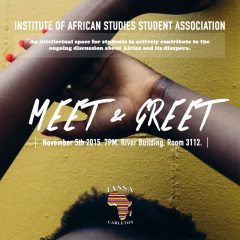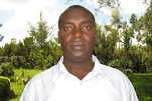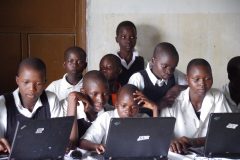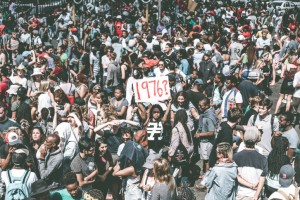
African Studies Newsletter |
Talk @ Carleton: “Troubling Tropes: The African Child in Colonial Postcards of the Early 1900s” The Institute of African Studies Presents “Troubling Tropes: The African Child in Colonial Postcards of the Early 1900s” with Monica Eileen Patterson, Assistant Professor, Carleton University Monica Eileen Patterson is an Assistant Professor in the Institute of Interdisciplinary Studies at Carleton University. She received her doctorate in Anthropology and History and a certificate in Museum Studies from the University of Michigan. Patterson is co-editor of Curating Difficult Knowledge: Violent Pasts in Public Places (Palgrave Macmillan, 2011) and Anthrohistory: Unsettling Knowledge and Questioning Discipline (University of Michigan Press, 2011). As a scholar, curator, and activist, she is particularly interested in the intersections of memory, childhood, and violence in postcolonial Africa, and the ways in which they are represented and engaged in contemporary public spheres.
In this presentation, She will examine and contextualize the dominant tropes found in representations of African children in postcards produced in South Africa and beyond in the early 1900s. She will also consider the circulation of these images and the ideas about Africa and Africans that they reflected and helped produce, both then and now.
This is part of the African Studies Brownbag Seminar Series (http://www.carleton.ca/africanstudies/) For more information, please contact the Institute of African Studies at 613-520-2600 ext. 2220 or African_Studies@carleton.ca *For a campus map, please see: http://carleton.ca/campus/map/ |
|||||||||||||||||||||||||
Event @ Carleton: Institute of African Studies Student Association (IASSA) Meet & GreetThe Institute of African Studies Student Association will be hosting its first ever “MEET & GREET”!!!!
|
|||||||||||||||||||||||||
Event @ Carleton: Faculty Works-in-Progress Presentation- “Understanding Power and Influence in the Global Refugee Regime”he Global and International Studies Program would like to announce our first Works-in-Progress speaker, Dr. James Milner, whose paper “Understanding Power and Influence in the Global Refugee Regime” will be presented on Friday, November 13th at 12pm in Room 2420 R River Building. All papers will be pre-circulated two weeks in advance of each paper presentation. Please register in advance using the form below in order to receive copies of discussion papers. In the aftermath of World War II, states formalized a global refugee regime. At the core of this regime were norms, including the 1951 Convention relating to the Status of Refugees, and institutions, especially the Office of the United Nations High Commissioner for Refugees (UNHCR). This regime was created to perform two core responsibilities: to help ensure the protection of refugees and to find a timely solution to their plight. More than 60 years later, however, it is evident that the global refugee regime has not been able to predictably fulfil these two core functions. Today’s headlines tell stories of refugees engaging in perilous journeys across sea and land to seek asylum, and the very limited protection they receive from many host states. More generally, however, refugees are now spending longer in exile than ever before. In the early 1990s, it took on average 9 years to resolve a refugee situation. Today, that average is closer to 20 years. Understanding the politics and shortcomings of the global refugee regime has been a sustained area of research in the interdisciplinary field of refugee studies for more than two decades, yet we know surprisingly little about how different actors influence the regime. While a range of actors seek influence, how do we understand the factors that determine their ability to influence the regime? Who has influence? When? Under what circumstances? What are the mechanisms of influence? And how can different actors influence both the decisions made at the global level and the ability to influence these decisions at the local level?
|
|||||||||||||||||||||||||
Canadian Institute for Conflict Resolution
We are honored and grateful to have Jean de Dieu Basabose as a guest speaker. In his speaking tour, Basabose focuses on Reconciliation after extreme violence, such as the Rwandan war and genocide, and shares his personal responsibility to reconcile. Born of mixed parentage from ‘antagonistic ethnisized groups”– Hutu and Tutsi, Basabose isconnected to and has ties with both of the groups in conflict. He has always been aware of his ‘indivisibility’, and is convinced that it is his vocation to be a ‘reconciler’ in a divided society. His mixed background helps him overcome the divisions and places him in a natural position to fulfill his vocation. With more than 12 years experience in peacebuilding work, Jean de Dieu Basabose has facilitated numerous trainings and workshops on building peace, mediation, networking, community organizing, organizational governance, monitoring local peace initiatives, andNonviolent Communication. Through Shalom Educating for Peace, a peace education organization he co-founded in 2007 and codirects, Basabose is making efforts to build and sustain positive peace through peace and nonviolence education. As a committed peacebuilder, he is motivated to offer to others the best he can and thus contribute to building a just, inclusive and peaceful world. He holds a Master’s degree in ConflictResolution and Peace Studies from the University of Kwazulu Natal, South Africa. He recently completed Doctoral studies in Public Management at the Durban University of Technology. Basabose is one of three recipients of the International Public Policy Institute (IPPI) Global Peacemaking Award 2012. |
|||||||||||||||||||||||||
Institut canadien pour la résolution des conflits
|
|||||||||||||||||||||||||
NB2PW Mixer Series-Dress for AccessWednesday, November 11, 2015 NB2PW will again be hosting Dress for Access, a clothing drive in support of the New Life Project. The New Life Project rehabilitates female street-workers by offering them training to develop marketable skills and clothing for mainstream employment. On graduation from the program they are given clothing appropriate for job interviews and their new jobs. Costs: Free with appropriate clothing and accessories donation. Otherwise – $10 per person at the door. Gently used and/or new women’s professional/business clothing and accessories. All clothing and accessories (as well as a portion of entry fee proceeds) will be donated to the New Life Project in Sierra Leone and Ivory Coast. |
|||||||||||||||||||||||||
House Concert Fundraiser for Primary School in UgandaWhen: Saturday November 7, 7:15pm
Where: 37 Euclid Drive (Old Ottawa South)
Cost: $20.00
Paipir Primary school in Northern Uganda has 1000 pupils a quarter of whom are disabled. Earlier this year we brought 21 donated laptops to the school making it the only publicly funded primary school in Northern Uganda with a computer lab. We trained the teachers who are now teaching the students. Having computer skills increases the likelihood that these children will go on to secondary school and higher education. Unfortunately, power is extremely unreliable in this part of the country. To raise funds to get solar panels at the school, we have organized a house concert to which you are cordially invited! Duo D' accord will be opening for Chris McLean (http://www.chrismaclean.com). Duo D' accord has been playing folksy, bluesy music for 10 years together. Chris McLean stretches herself across a wide musical spectrum from traditional and contemporary folk to jazz and world music. She has won the 2010 Canadian Folk Music Award Nominee, English Songwriter of the Year and the 2008 Ontario Arts Council Colleen Peterson Award for Songwriting. Both groups are fantastic. I hope you will join us. The cost of the ticket is $20. To reserve a seat, please pay on our fundraising site: https://www.gofundme.com/ |
|||||||||||||||||||||||||
REMINDER- Book Launch & Talk @ Carleton: Women, Urbanization, and the Right to the City in South Africa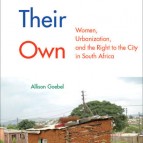 The Institute of African Studies Presents a Public Talk and Book Launch – with Allison Goebel, Queen’s University
Allison Goebel is an Associate Professor in the School of Environmental Studies at Queen’s University. She is the author of Gender and Land Reform: The Zimbabwe Experience and will be talking about her next, and newly released, book with McGill-Queen’s University Press, On Their Own. Copies of the book (courtesy of Octopus Books) can be purchased after her talk. |
|||||||||||||||||||||||||
Volunteer Opportunities with Veterinarians Without Borders/Vétérinaires Sans Frontières (VWB/VSF) in Kenya, Tanzania and elsewhereIn 2015, VWB/VSF launched a new program that substantially increased its capacity to send volunteers overseas. Volunteers for Healthy Animals and Healthy Communities will involve more than 100 volunteer placements in Africa and Asia over a five year period. The program will be looking for veterinarians, veterinary technologists, animal and human nutritionists, professors of veterinary medicine, veterinary clinic managers, rural development specialists, business development advisors, monitoring and evaluation and gender specialists and others. Placements may be as short as 4 weeks or as long as 2 years, depending on the position. Volunteers will receive a basic stipend which covers living costs overseas, and they will be asked to undertake some modest fundraising, both to offset program costs and to share the VWB/VSF story with family, friends and colleagues. For more information: https://www. |
|||||||||||||||||||||||||
Call for Papers- Africa in the World (French)The Project Africa N’Ko: Africa in the World Translation: disputing the sens of african social realities Dakar, 3-6 decembre 2015
Afrique N’Ko, dire Afrique dans le monde est un projet à long terme qui a pour objectif d’établir une synergie entre la pluralité des réflexions sur la production de connaissances dans les sciences humaines en et sur l’Afrique. À cette fin, sont organisées régulièrement des conférences sur des thèmes divers. Après celle tenu à Dakar qui a débattu des bibliothèques coloniales, la prochaine conférence discutera de la question de la traduction. En effet, la notion de traduction en science sociales et dans les humanités se réfère habituellement à l’opération de rendre quelque chose de dit et d’écrit dans une langue intelligible dans un autre. Nous souhaitons élargir cette acception restrictive afin d’y inclure toute forme de conversion d’un espace sémantique à un autre. Toute traduction étant aussi une interprétation singulière, la question du rôle de la traduction dans la production de connaissances est cruciale. En effet, les concepts dans les sciences sociales et dans les sciences humaines ont assumé une fonction centrale dans la constitution de l’Afrique comme un objet d’enquête, une représentation sociale et espace de pratiques. Afin d’approfondir cette perspective il convient donc d’élargir, au-delà de la linguistique, l’opération de traduction à l’ensemble des pratiques sociales. La traduction pose comme un impératif la question de l’altérité, de la différence, de la définition de l’autre. Au service du colonialisme, elle sert à nier l’existence des autres langues, des autres peuples et à légitimer leurs infériorités constituant ainsi un des fondements de la « supériorité » occidentale. Edward Saïd, a montré le lien étroit qui relie les constructions discursives aux formes du savoir, à la définition des vérités et à la justification de la domination sur les peuples colonisés. L’examen des phases de ce processus de production des connaissances sur l’Afrique questionne la fonction sociale et politique de la traduction dans le contexte colonial et postcolonial. En effet, il est légitime de se demander comment s’opère cette conversion des langues, des cultures, des techniques et des existences sociales entre des espaces sociaux inscrits dans des rapports inégaux de domination. Quel traitement sera réservé, de part et d’autre, aux emprunts reçus? La conférence invite à une réflexion sur la traduction en tant qu’acteur dans les cadres signifiants impériaux et indigènes. Dans ce sens, il nous parait important d’examiner les modalités de dépréciation des valeurs et pratiques africaines dans le discours dominant. De même, il est impératif d’examiner les formes d’appropriation, incorporation, (revendiquées, détournées ou secrètes) de fragments des modes d’exister des colonisés par les colonisateurs. De cette imposition d’une équivalence défavorable aux sociétés africaines, apparait très tôt l’anthropologie comme un des outils de cette opération de socialisation. Le travail de l’anthropologue consiste à récolter les imaginaires, les mythes, les croyances, le savoir d’une société et de les traduire dans une autre langue, puis dans le langage savant de l’anthropologie. Ce processus de production des connaissances soulève des questions sur les limites de la maitrise linguistique, et conteste également la capacité de l’anthropologue à établir des « configurations traductives » satisfaisantes aux deux parties. Certains auteurs arguent que les façons dont nous parlons, écrivons, lisons et interprétons sont tous impliqués dans le processus de traduction et qu’il est par conséquent impossible de réussir un transfert interlingual équitable sans altérer consciemment ou inconsciemment l’identité de la société traduite, sans déformer l’autre. Une relation qui n’échappe pas aux rapports de pouvoir, aux échanges inégaux. Elle pose clairement la question du statut des savoirs issus de cette trame centrale : 1) comment les sciences sociales encore enfoncées dans cet irréductible carcan de la pluralité des expressions peuvent-elles revendiquer un quelconque universalisme? 2) en tant que procédé la traduction n’est-elle pas, derrière une fausse neutralité, un instrument de domination symbolique ? 3) dans quelle(s) condition(s) est-il possible d’utiliser les traductions sans incorporer l’idéologie qu’elles véhiculent ? 3) est-il possible d’envisager une traduction équilibrée faisant justice aux différentes parties ? 4) dans quel sens la traduction équilibrée transforme-t-elle l’architecture conceptuelle et méthodologique de nos savoirs contemporains sur l’Afrique ? 5) Certains analystes soulignent le fait que la traduction peut servir le projet d’une humanité commune sans uniformiser les langues et les cultures. Cet impératif éthique humaniste peut-il s’appliqué à la production des savoirs en et sur l’Afrique? Il est essentiel d’examiner les modalités concrètes de la production des savoirs sur l’Afrique à partir de l’héritage colonial et avancer les conditions d’une mise en relation de sens, sans « deuil des identités », des sociétés humaines. Cette dernière perspective nous invite à une remise en cause radicale du « grand partage » et de l’inégale rationalité des peuples qu’il induit. La traduction, qui englobe toutes les dimensions du social, peut-elle ignorer les formes rebelles de contre-traduction ? Celles rétives à la domination symbolique que portent les interprétations courantes. Il est admis que les connaissances produites sur les sociétés africaines reposent, d’une part, sur la nature inégale des relations intellectuelles et politiques entre l’Afrique et l’Occident et, d’autre part, par les récentes réactions critiques qui ont ouvert la voie à une reconstruction des savoirs établis. Comment alors l’interrogation sur le mode de production de connaissances sur l’Afrique peut contribuer à l’amélioration de la production universelle de connaissances dans les sciences sociales et humaines ? La traduction comme opération de mise en correspondance d’ordres sociaux nous oblige à introduire à toutes les étapes de la production, de la présentation et des usages des connaissances sur l’Afrique la question de l’identité, de la puissance des régimes de valeurs affrontés. Discuter les modalités de la traduction, de la translation d’un système social vers un autre, c’est poser la question de l’authenticité des « faits » collectés mais c’est surtout contester le sens courant, dominant, qui est donné en surplomb aux réalités sociales africaines. au Professor Jean-Bernard Ouédraogo jean-bernard.ouedraogo@ehess.fr Les propositions de communication sont à envoyer aux adresses suivantes pour le 15 novembre 2015 (dernier délai) : d’une demi page, la proposition contiendra un intitulé, une brève notice biographique de l’auteur (avec une adresse mail), un exposé succinct du sujet traité, un terrain et l’approche méthodologie adoptée. Comité scientifique du colloque : Prof. Remy Bazenguissa-Ganga, sociology, EHESS, Paris Prof. Mamadou Diawara, anthropology, Goethe University, Frankfurt, Point Sud Bamako Prof. Mamadou Diouf, history Columbia University Prof. Frieda Ekoto, literature, University of Michigan) Prof. ElÃsio Salvado Macamo, sociology, University of Basel Prof. Achille Mbembe, history, University of the Witwatersrand, South Africa) Prof. Jean-Bernard Ouédraogo, sociology, CNRS, Paris Prof. Ebrima Sall, sociology, CODESRIA, Dakar Prof. Rawya Tawfik Amer, political science, Cairo University |
|||||||||||||||||||||||||
Call for Papers-Africa in the WorldThe Project Africa N’Ko: Africa in the World Translation: disputing the sense of African social realities Dakar, 3- 6 December 2015
Africa N’Ko, Africa in the World is a long-term project aiming to create a synergy from among the plurality of reflections on the production of knowledge in human sciences both in and on Africa. To this end, conferences on a range of themes are regularly organised. Following the Dakar conference where debates focussed on colonial libraries, the forthcoming conference will deal with the theme of translation. The notion of translation in social sciences and humanities generally refers to the operation by which something that has been spoken or written in a given language is rendered intelligible in another. We would like to broaden this restrictive accepted meaning to include any form of conversion from one semantic space to another. Since each translation is also a unique interpretation, the question of the role of translation in the production of knowledge is crucial. Indeed, social science and human science concepts have assumed a central function in the constitution of Africa as an object of enquiry, a social representation, and a space of practices. To push the boundaries of this perspective, the operation of translation must be extended beyond linguistics, to include the whole range of social practices. Translation raises the vital questions of alterity, difference and how we define the Other. As a tool of colonialism, it is used to deny the existence of other languages and peoples and to legitimize their inferiorities, thereby constituting one of the bases of western “superiority†. Edward Saïd pointed out the close relationship which links discursive constructions to forms of knowledge, to the definition of truths and to the justification of the domination over colonized peoples. Examination of the phases of this process of production of knowledge on Africa explores the social and political function of translation in a colonial and postcolonial context. It is indeed legitimate to enquire into the workings of the conversion of languages, cultures, techniques and social existences between social spaces where relations of domination are unequal. In what way, on each side, are loan words treated? This conference calls for a reflection on translation as an actor in imperial and indigenous meaning frameworks. In this sense, it seems important to examine the modalities of the depreciation of African values and practices in the dominant discourse. It is also essential to examine how fragments of modes of existence of colonized peoples have been appropriated and incorporated (overtly, distortedly or secretly) by colonizers. From the imposition of an equivalence that was unfavourable to African societies, anthropology rapidly emerged as one of the tools of this operation of socialization. The work of the anthropologist consists of recording the imaginaries, myths, beliefs and knowledge of a society and translating them first into another language and then into the academic language of anthropology. This process of knowledge production raises questions on the limits of linguistic proficiency, and also contests the capacity of anthropologists to establish “translation configurations†that satisfy both parties. Certain authors argue that the way in which we speak, write, read and interpret are all involved in the translation process and that it is therefore impossible to achieve an equitable interlingual transfer without consciously or unconsciously distorting the society that has been translated, and without misrepresenting the Other: a connection which is not unaffected by relationships of power and unequal exchanges. It clearly raises the issue of the status of knowledge arising from this central framework: 1) how can social sciences, weighed down as they are by the irreducible yoke of the plurality of expressions, claim to be in any way universal? 2) is translation as a procedure not, behind a false neutrality, an instrument of symbolic domination? 3) in what condition(s) can translations be used without incorporating the ideology they convey? 3) is it possible to envisage a balanced translation that does justice to both parties? 4) in what way does balanced translation transform the conceptual and methodological architecture of our contemporary knowledge on Africa ? 5) Certain analysts underline the fact that translation can contribute to the project of a common humanity whilst avoiding the uniformity of languages and cultures. Can this humanist ethical imperative be applied to the production of knowledge in and on Africa? It is essential to examine the concrete modalities of the production of knowledge on Africa stemming from colonial heritage and put forward conditions that allow human societies to connect meaning without having to give up their identities. This last perspective invites us to radically call into question the outcome of the “Scramble for Africa†and the unequal rationality of peoples it brings about. Can translation, which encompasses all the dimensions of social issues, ignore resistant forms of counter-translation, those recalcitrant to the symbolic domination conveyed by current interpretations? It is generally recognized that knowledge produced on African societies is based, on the one hand, on the unequal nature of intellectual and political relations between Africa and the West, and on the other hand, on the recent critical reactions which have paved the way for a reconstruction of established knowledge. How therefore can questioning the method of production of knowledge of Africa contribute to improving production everywhere of knowledge in social and humans sciences? Translation as a levelling operation for social orders requires us to introduce, at each step of the production of the presentation and uses of knowledge on Africa, the question of identity and the respective power of the confronted value systems. Discussing the modalities of translation, from one social system to another, necessitates not only questioning the authenticity of collected “facts†, but also and especially contesting the dominant standard meaning which overhangs African social realities. To: Professor Jean-Bernard Ouédraogo jean-bernard.ouedraogo@ehess.fr Proposals should be sent to the following addresses by 15th November 2015 at the latest. They should cover half a page and include a title, brief biographical details of the author (and email address), a short outline of the subject of the communication, field and relevant methodological approach. Scientific committee of the colloquium:
Prof. Remy Bazenguissa-Ganga, sociology, EHESS, Paris Prof. Mamadou Diawara, anthropology, Goethe University, Frankfurt, Point Sud Bamako Prof. Mamadou Diouf, history Columbia University Prof. Frieda Ekoto, literature, University of Michigan) Prof. ElÃsio Salvado Macamo, sociology, University of Basel Prof. Achille Mbembe, history, University of the Witwatersrand, South Africa) Prof. Jean-Bernard Ouédraogo, sociology, CNRS, Paris Prof. Ebrima Sall, sociology, CODESRIA, Dakar Prof. Rawya Tawfik Amer, political science, Cairo University |
|||||||||||||||||||||||||
PhD studentship in South AfricaEVALUATING COMMERCIAL CATTLE PRODUCTION AS A RESILIENT LIVELIHOOD OPTION FOR EMERGENT SMALLHOLDER FARMERS IN EASTERN CAPE PROVINCE, SOUTH AFRICAEligibility: UK/EU/International Award Details: Tuition Fees + Bursary Duration: 3 years Fixed Term (Studentships are available to commence during academic year 15/16- start date January 2016) Application deadline: November 16th Informal enquiries are advised before application; contact to Dr. James Bennett discuss this opportunity. Congratulations on taking your first steps toward a Research Degree with Coventry’s Faculty of Engineering, Environment and Computing. As an ambitious and innovative University, we’re investing an initial £100m into our new research strategy, ‘Excellence with Impact’. Through original approaches from world-leading experts, we’re aiming for our research to make a tangible difference to the way we live. As a research student you are an integral part of Coventry’s lively and diverse research community and contribute to our reputation for excellence. With our exceptional facilities and superb support mechanisms you are afforded every opportunity for academic success. THE PROJECTSouth Africa represents an unusual case of agrarian reform in that a private livestock production sector, dominated by white farmers and occupying the majority of agricultural land, exists in parallel with a relatively neglected subsistence livestock sector consisting of black smallholder farmers located in pockets of communally owned land. Land reform policies are currently addressing this historical imbalance by transferring former private farms to black ownership but critics argue that this has led to the land becoming commercially unproductive and has the potential to undermine food security. It has also been argued that there is insufficient support for existing livestock farmers in communal areas. Focusing on Eastern Cape Province in South Africa, where land reform farms exist in close proximity to traditional communal areas, this project aims to evaluate the potential of community-based commercial cattle production to provide a resilient livelihood option for black, smallholder farmers. In particular it seeks to critically review the evidence for failure of land reform to deliver commercial livestock production, identify the key barriers to smallholder farmers engaging successfully with this and develop mechanisms for better integration of smallholder farmers into the commercial livestock sector. In so doing it will develop an evidence base to inform both the policy and practice of current land reform approaches. ABOUT THE CENTRE/DEPARTMENTCAWR is driving innovative, transdisciplinary research on the understanding and development of resilient food and water systems internationally. The Centre’s research develops and integrates new knowledge in social, agroecological, hydrological and environmental processes, as well as the pivotal role that communities play in developing resilience. Unique to this Centre is the incorporation of citizen-generated knowledge – the participation of farmers, water users and other citizens in transdisciplinary research, using holistic approaches which cross many disciplinary boundaries. CAWR also aims to advance resilience science through creative work on the governance of food systems, hydrological change, urban water, river processes, water quality and emerging pollutants. SUCCESSFUL APPLICANTS
Additionally
ELIGIBILITY & APPLICATION PROCEDUREApplication Procedure: Application form and covering letter of up to 1000 words setting out how you might develop the project and why you are the right candidate for this studentship. Before completing the application, it is advised that you contact Dr. James Bennett for an initial informal discussion about the opportunity. More on how to apply can be found here. Eligibility: All UK/EU/International students are eligible to apply that meet the academic requirements, the eligibility criteria can be found here. |
|||||||||||||||||||||||||
IAS News:Susanne Klausen on Witnessing South Africa’s #FeesMustFall Campaign |
|||||||||||||||||||||||||

|
African Studies Newsletter is produced by the Subscription preferences can be changed below. |
|
